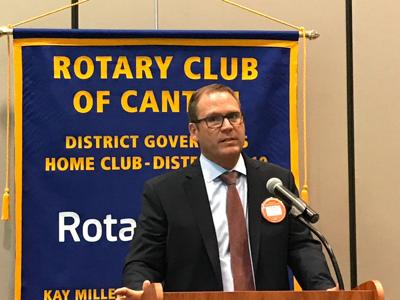- By Donald Campbell

When someone is contemplating #suicide, the time to act is now and the person to act is you, a counselor told a Canton civic club on Tuesday.
#JamesDonaldsononMentalHealth –
Welcome to the “next chapter” of my life… being a voice and an advocate for #mentalhealthawarenessandsuicideprevention, especially pertaining to our younger generation of students and student-athletes.
Getting men to speak up and reach out for help and assistance is one of my passions. Us men need to not suffer in silence or drown our sorrows in alcohol, hang out at bars and strip joints, or get involved with drug use.
Having gone through a recent bout of #depression and #suicidalthoughts myself, I realize now, that I can make a huge difference in the lives of so many by sharing my story, and by sharing various resources I come across as I work in this space. #http://bit.ly/JamesMentalHealthArticle
Members of the Canton Rotary Club learned more about the issue of suicide, Britt Parramore of PathLight Counseling was the guest speaker at Tuesday’s meeting.
Parramore said Cherokee County has a crisis, that the reach of addiction, #mentalillness and suicide is long and that there is a correlation among those three things. According to some of the most recent statistics, he said that suicide is the 10th leading cause of death in the United States, the third leading cause of death among young people between the ages of 10 and 24 and the second leading cause of death for college students.
When studying the factors that go into a person making the decision to take their life, Parramore explained that psychological autopsy studies have shown approximately 90% of those who died by suicide have suffered from psychiatric disorders, such as borderline personality disorder, schizophrenia, alcohol or substance abuse, bipolar disorder or major depressive disorder.
Along with these, he listed a multitude of risk factors that can lead to someone considering suicide as an option. Bio/psycho/social risk factors, he explained, can include #mentaldisorders, substance abuse issues, a history of trauma or abuse, previous #suicide attempts and a family history of suicide. Situations such as homelessness, the loss of a job or a relationship and relatively easy access to lethal means were all categorized as environmental risk factors, while socio-cultural risk factors included a lack of social support, barriers to accessing needed health care and cultural or religious beliefs.
With the topic of youth #suicide being so key more recently, Parramore listed some of the suicide warning signs, as well as ways anyone could do something to keep others from killing themselves. Warning signs may include reckless behavior, #anxiety and agitation, difficulty sleeping, dramatic mood changes, the feeling of being a burden and a strong sense of loneliness, alienation and isolation. When dealing with someone who may be considering suicide, Parramore said there are three basic steps anyone can do to intervene in the situation. First, show the person you truly care and are there for them. Second, do not hesitate to raise the subject and ask questions, but avoid being confrontational. Instead, he suggested asking questions like “are you thinking about suicide?,” “What thoughts or plans do you have?,” “How long have you been thinking about suicide?,” “Have you thought about how you would do it?” and “Do you really want to die, or do you want the pain to go away?” Lastly, he mentioned assisting the person in need to get help by reassuring them, knowing referral resources, outlining a safety plan (including making arrangements for the person to be taken to a source of help) and perhaps most importantly, not leaving the person by themselves.
“The time to act is in the moment,” Parramore said. “The person to act is you.”
To conclude his prepared remarks, Parramore listed off a number of resources available for those who may be dealing with thoughts of suicide. These included the #NationalSuicidePreventionLifeline (1-800-273-TALK or www.suicidepreventionlifeline.org), the Statewide Office of Suicide Prevention (www.helppromotehope.com), the Suicide Prevention Resource Center (www.sprc.org) and the American Association of Suicidology (www.suicidology.org). He also said he believed the growth of treatment and accountability courts have proven to be valuable tools, as have a recent grant the school system has received and the education being provided to parents and teachers about the resources available for people in crisis.
At the end of his presentation, Parramore responded to a couple of questions from the gathered Rotarians, both of which involved the effects of social media on #mentalhealth. Parramore explained he believed that #socialmedia did play a key role in the issue, as people who may be relatively insecure and have access to social media at any time of the day to be able to see what vacations and other similar activities their friends are engaging it may have their self-image take a hit as a result. He also said having outlets like these have caused people to become more connected, yet more isolated at the same time, which runs contrary to the human need for social interaction.
Following the presentation, members of the Rotary added further comments, including that a Cherokee County Suicide Prevention Coalition was being established to serve as an additional resource for those in need, while the organization as a whole was making a donation in Parramore’s name to the Sequoyah Regional Library.



